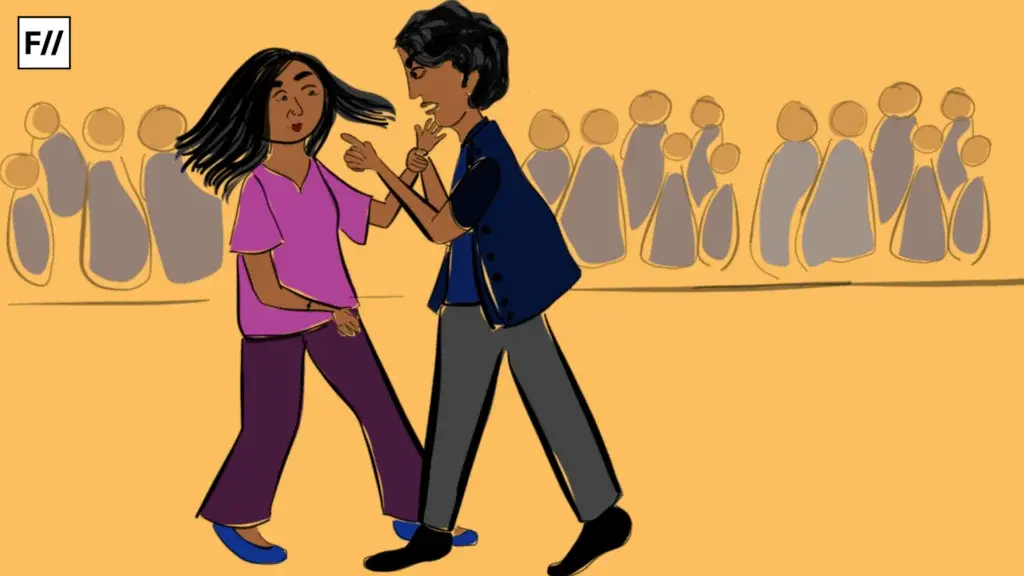Today on the International Day To End Violence Against Sex Workers, FII along with National Network of Sex Workers India (NNSW India) are talking about the violence that all sex workers face: the violence of not being heard. From fighting stigma associated with sex work to advocating for the full decriminalisation of sex work – sex workers in India are at the forefront of the fight for their rights, yet it is their voices that are often ignored and overlooked. This year, it is especially important to talk about the rights of sex workers, as the COVID-19 pandemic across the globe has deeply affected the sex workers’ community. Far from being a “non-essential” activity, sex work is their bread and butter. The pandemic has thus placed on the block the livelihoods of tens of thousands of sex-workers, their physical and mental well-being and that of those dependent on them. It’s important now more than ever to listen to them and amplify their voices.
1. Sex Work is Work
Sex work is defined as provision of sexual services in cash or kind within a commercial context. Sex Workers from the SWASA network [Sex Workers and Allies South Asia] across the region challenge the articulation that sex work is selling sex or selling bodies [deh vikri]. Instead, they provide services directly to clients as independent workers or through third parties. Pushed to the margins as `immoral’ workers, people in sex work are denied safe working conditions and are forced to function in an environment where exploitative practices flourish.

2. Decriminalising Sex Work
Sex workers, activists, and organisers have been advocating for the decriminalisation of sex work, as that would increase sex workers’ legal protection and make it easier for them to access justice and healthcare. Decriminalising sex work and considering it no different from any other work can be a step towards destigmatising sex work. Legal recognition of sex work will also maximise sex workers’ protection, dignity, and equality.

3. Sex Work is not Trafficking
It’s really important to understand that sex work is not trafficking. The narrative of all women in sex work being victims of exploitation, slavery and servitude overlooks the agency of providers who continue to do sex work of their own volition. It further silences their voices and pushes them to the margins. As service providers, sex workers are able to organise, unionise, and work towards their welfare against discrimination and unfair practices in the sex work business.

Also read: Why Is Sex Work Not Seen As Work? – Part 1
4. Violence against Sex Workers
The stigma that surrounds sex work and the discrimination that sex workers face often results in violence against sex workers, including physical attacks, harassment by clients, family members, community, and State authorities. Many sex workers are forcibly detained and rehabilitated, and they also face a consistent lack of legal protection. Measures to address trafficking in persons often overlook the need to protect the right of sex workers.

5. Access to Justice
Since sex work is stigmatised, sex workers are often denied access to justice. This leaves them vulnerable to abuse and exploitative practices. While sex work in India is not illegal, according to laws such as the Immoral Traffic (Prevention) Act, 1956, supporting activities such as maintenance of brothels or soliciting customers are punishable offences. Sex workers have therefore consistently been advocating for the full decriminalisation of sex work to prevent them from incarceration.

6. Access to Healthcare
Many sex workers face challenges in gaining access to essential health services, including for treatment for HIV/AIDS and sexually transmitted infections (STIs). A safe and healthy workplace is the right of every sex worker. When sex workers are denied access to health services, including life saving commodities such as condoms, lubes, they are denied their workers rights.

7. Workers’ Rights
Ensuring workers rights of sex workers is of the utmost importance. When their workers rights are denied, sex workers are denied the right to organise, unionise as workers. It stops them from seeking recognition as informal workers, accessing compensation packages provided by the government for informal workers, negotiating for pension for older sex workers and other entitlements such as demanding safe working conditions, fighting violence and exploitative practices.

Also read: International Sex Workers Day: Time To Detach Sex Work From Morality
8. The CEDAW GR 8
While the Convention on the Elimination of all Forms of Discrimination Against Women, i.e., CEDAW’s General Recommendation (GR) 38 is clear about trafficking for every other form of female labour, it targets `prostitution’ and refuses to accept provision of sexual services as a form of labour. Since sex work is a livelihood option for many women, especially marginalised women, the CEDAW GR 38, with its narrow understanding of sex work, denies them their rights.

9. Recognising Sex Workers as Informal Workers
The National Human Rights Commission (NHRC) urged states to issue temporary documents to sex workers so that they could access health and welfare benefits. On October 7, NHRC’s advisory ‘Human rights of women in the context of Covid-19’, recognised sex workers as informal workers. This was later amended following backlash from pro-abolitionist activists, and it was recommended that sex workers instead be given help on “humanitarian grounds” as informal workers during the Covid-19 pandemic.

The National Network of Sex Workers (NNSW) is a national network of sex worker- led organisations and allies committed to promoting the Rights of Sex Workers in India. NNSW consists of 12 CBOs/ State Networks/ State Federations/ Collectives and 8 NGOs across seven state. With a strength 50,000 members, it is the only national network that brings together female, transgender and male sex workers with NGOs and sex work(er) rights activists. To know more about NNSW India, visit their website or follow them on Facebook, Twitter and Instagram.
About the author(s)
Feminism In India is an award-winning digital intersectional feminist media organisation to learn, educate and develop a feminist sensibility and unravel the F-word among the youth in India.




